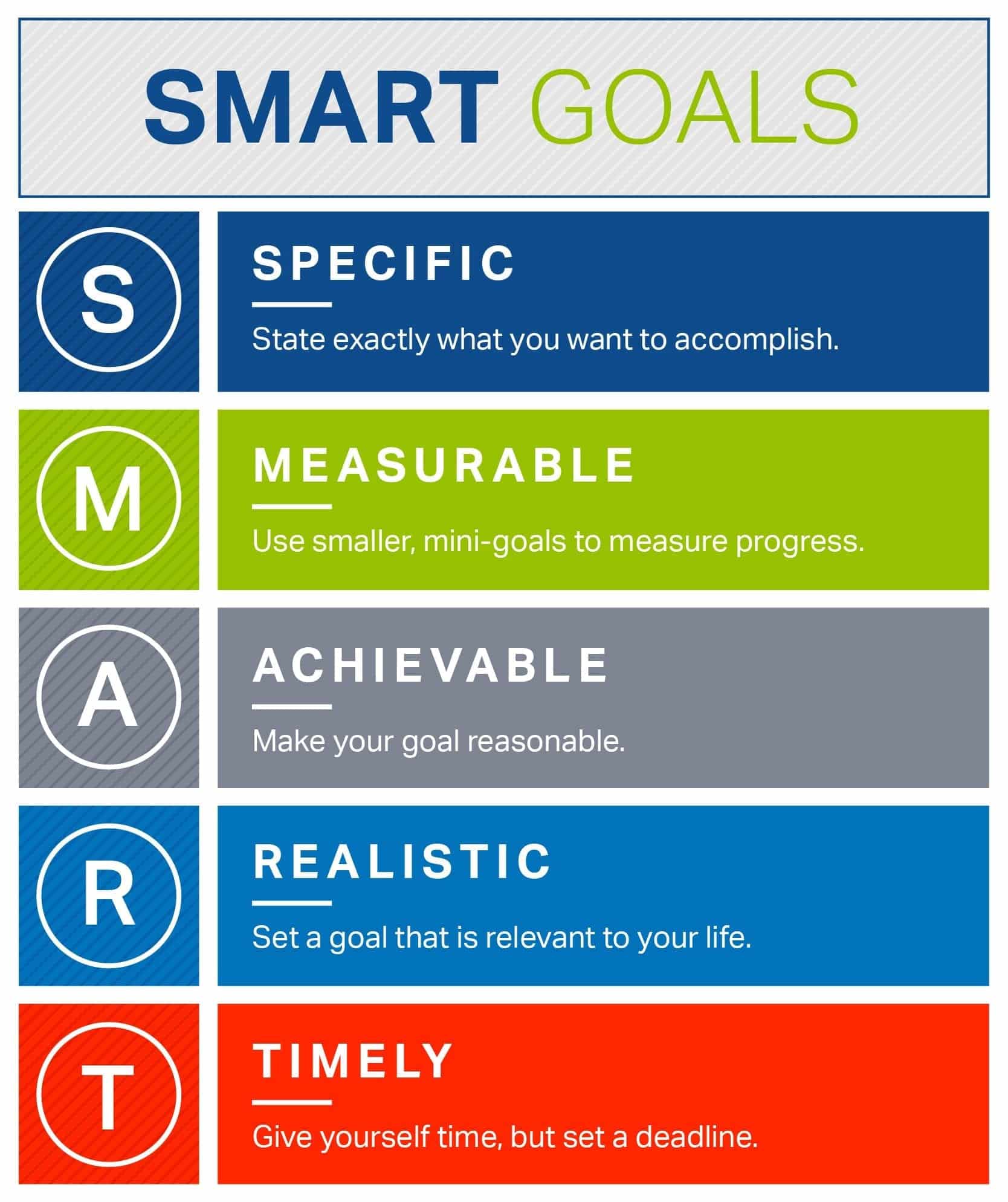Whether you’re setting resolutions for the year ahead or just trying to revamp your ongoing intentions for healthier living, you’re most likely faced with some major goal setting.
Being able to put goals into place properly is crucial for success. Even if you enter into the year with bad-habit-crushing enthusiasm, statistics show it’s tough to maintain that energy. In fact, nearly 1/3 of those who make resolutions in January don’t even last a week before abandoning them.
How do you make sure you’re not in that group? By getting SMART. This mnemonic stands for goals that are specific, measurable, achievable, realistic and timely.

“If you want to be successful with your fitness or nutrition goals, you need to look a the habits and patterns in your life getting in the way,” says personal trainer Shanna Ferrigno, author of “The Reset Plan,” and daughter of “The Incredible Hulk” Lou Ferrigno. “When you are trying to improve your diet and lifestyle, most people do OK, until some life event occurs that they can’t control, and triggers them back to their old patterns.”
Focusing on those SMART attributes creates goals that get you where you want to go. Here are some tips to help you plan:

One of the fastest ways to sabotage your goals is to make it as general as possible, such as “I want to get fit,” or “This is the year I eat healthier.” Without specificity, that unclear language leaves way too much room for interpretation.
Instead, pin down exactly what you want to accomplish, who might be helping you, how you’re going to achieve each mini-goal, which roadblocks you expect to encounter and why you’re choosing this goal over others.
The more specific you make each answer, the easier it will be to create a progress-based plan.

Having one large, beautiful goal is fine, as long as you have plenty of smaller, mini-goals that help you measure how you’re doing, according to James Tyler Dodge, a certified strength and conditioning specialist and performance coach at Professional Physical Therapy in New York.
“Without a sense of progress, you’ll have a more difficult time staying committed to your goals,” he says. “To achieve that understanding of progress, you have to be able to measure how you’re doing.”
For instance, you might set a goal of being able to deadlift half your bodyweight. Start light, employ a trainer for a few sessions to get you tips on form and create a weekly lifting schedule. Over time, you’ll lift a little more each week until you hit your goal, thanks to measurable progress. Then you get to enjoy setting a whole new goal to crush.

Setting out-of-reach goals is often one of the best ways to sabotage yourself. “I’ll never have dessert ever again,” you might say, or “I will go to the gym six days a week or I won’t go at all.”
It’s much better to allow yourself some slack when thinking of what you can achieve and make your goal reasonable enough to accomplish. For example, you might say, “Instead of a sugary dessert, I’m going to have a bowl of strawberries and Greek yogurt.” That’s more specific, as well as attainable — and won’t make you feel deprived, another trigger that leads back to bad habits.

In some SMART goal setting, this is also known as “relevant.” Either way, you’re looking at how your goal fits into your life, in a way that syncs with what you’ve already got going.
For example, setting a goal of doing a marathon every month may be specific and your training might be measurable — and even achievable — but it’s very possible that it can become a significant timesink that makes it more difficult to do your job or practically eliminates time with your family. It might feel great to crush that goal, but realistically, what are you sacrificing to get there? If it’s something you don’t want to give up, you may need to tweak that larger aim.
Being realistic also means knowing your limitations and setting goals based on steady work. Using the marathon example, maybe you’ve only run a mile so far. Signing up for a marathon that’s happening next month could be a recipe for injury, because you’ll be trying to ramp up your training way too fast. Choosing a half-marathon that’s a year away could be a very realistic goal based on your training plan.

When a new year or fresh start comes around, it’s incredibly tempting to go big on your goals — and unfortunately for many, that means trying to reach them sooner rather than later. But think of your aim as a long-term change that has to be implemented slowly, Ferrigno says.
Give yourself more time than you think you need, and it’s likely you’ll find it easier to maintain your momentum. But, at the same time, establish a deadline. That allows you to work backward when setting mini-goals, adds Dodge. You’ll get a sense of urgency that way, which can make your time management more efficient.
READ MORE > A BRILLIANT, NO-FAIL APPROACH TO RESOLUTIONS
In general, SMART goals can help you move toward achieving any resolution, whether that’s in the gym, in the kitchen, at work or at home. Taking the time to jot down how each goal meets the SMART criteria can be helpful for staying on track, says Ferrigno. Also useful is sticking to just one or two goals at a time, so you’re not trying to revamp your whole life at once.
“Change is hard, and it can be more difficult if we try and make too many changes at once,” she says. “Start small and gradually make lifestyle improvements. Stay in the moment and slay one goal at a time.”




